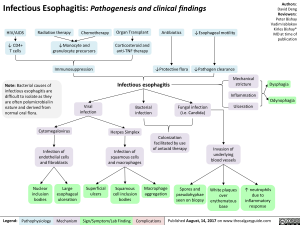Infectious Esophagitis: Pathogenesis and clinical findings
HIV/AIDS Radiation therapy Chemotherapy Organ Transplant Antibiotics I/Esophageal motility Tir CD4+ T cells 4,Monocyte and Corticosteroid and granulocyte precursors anti-TNF therapy • •
Immunosuppression
Note: Bacterial causes of infectious esophagitis are difficult to isolate as they are often polymicrobial in nature and derived from normal oral flora.
Cytomegalovirus Infection of endothelial cells and fibroblasts
I, Protective flora 4, Pathogen clearance
Authors: David Deng Reviewers: Peter Bishay Vadim lablokov Kirles Bishay* MD at time of publication
Mechanical stricture Inflammation Ulceration ,..,4 Dysphagia Infectious Viral Bacterial infection infection esophagitis • Fungal infection Odynophagia (i.e. Candida)
Herpes Simplex Infection of squamous cells and macrophages
Colonization facilitated by use of antacid therapy
Nuclear Large Superficial Squamous Macrophage inclusion bodies esophageal ulceration ulcers cell inclusion bodies aggregation Legend: Pathophysiology Mechanism Sign/Symptom/Lab Finding Complications
Spores and pseudohyphae seen on biopsy
• Invas.on of underlying blood vessels
• White plaques over erythematous base
‘1’ neutrophils due to inflammatory response
Foundations
Systems
Other Languages
Gastroenterology Dysphagia Infectious Esophagitis: Pathogenesis and clinical findings infectious-esophagitis-pathogenesis-and-clinical-findings

